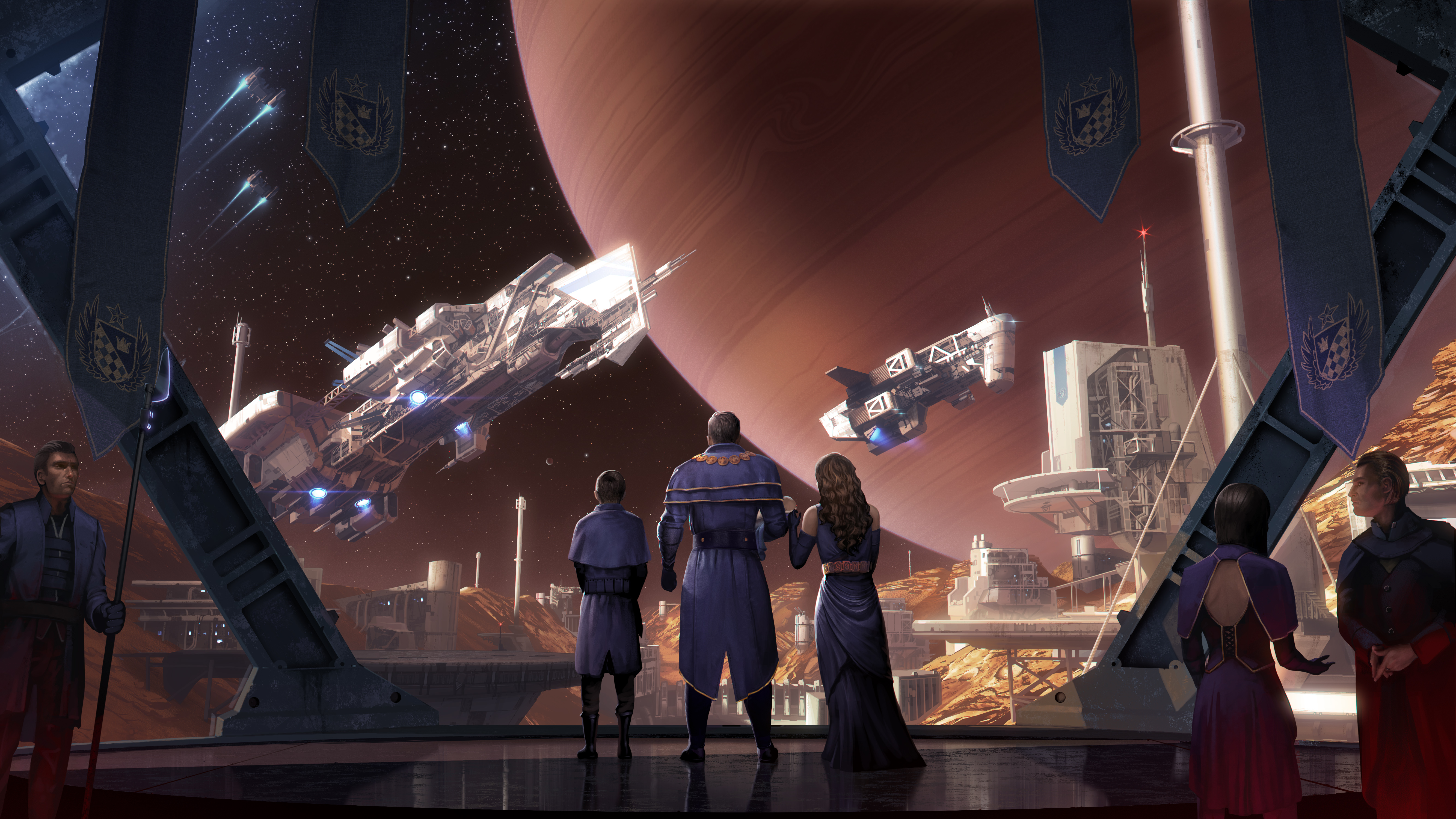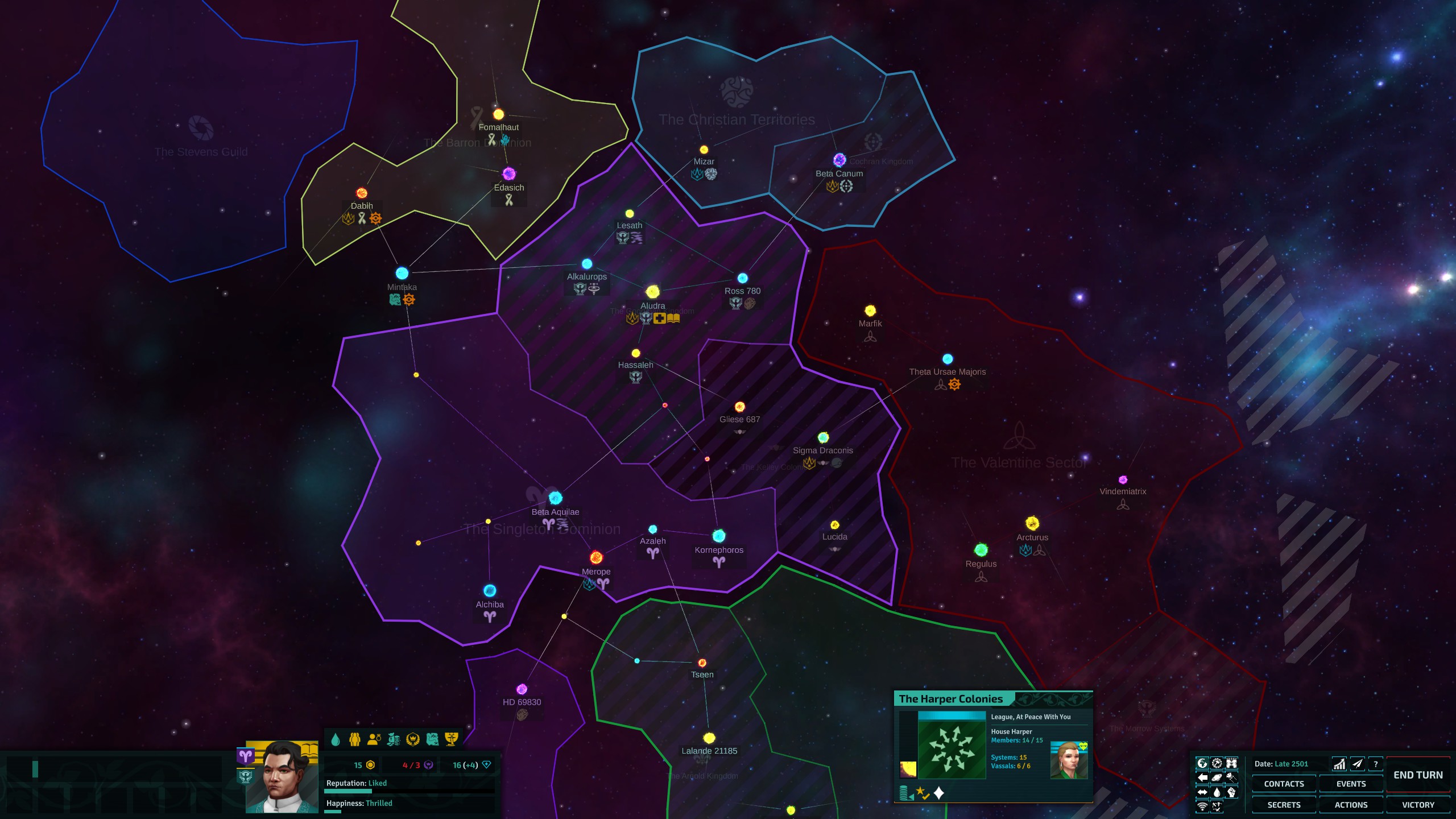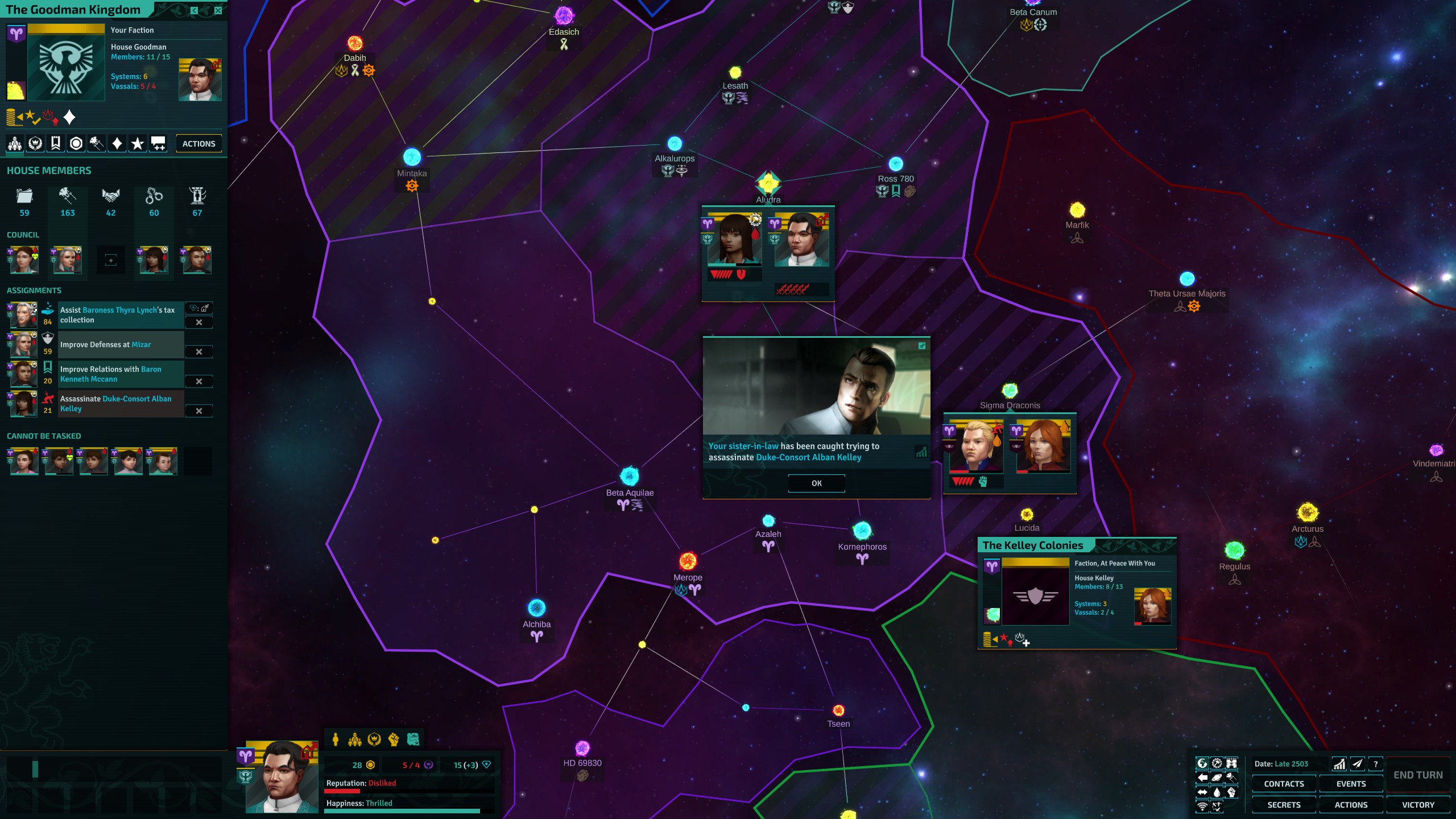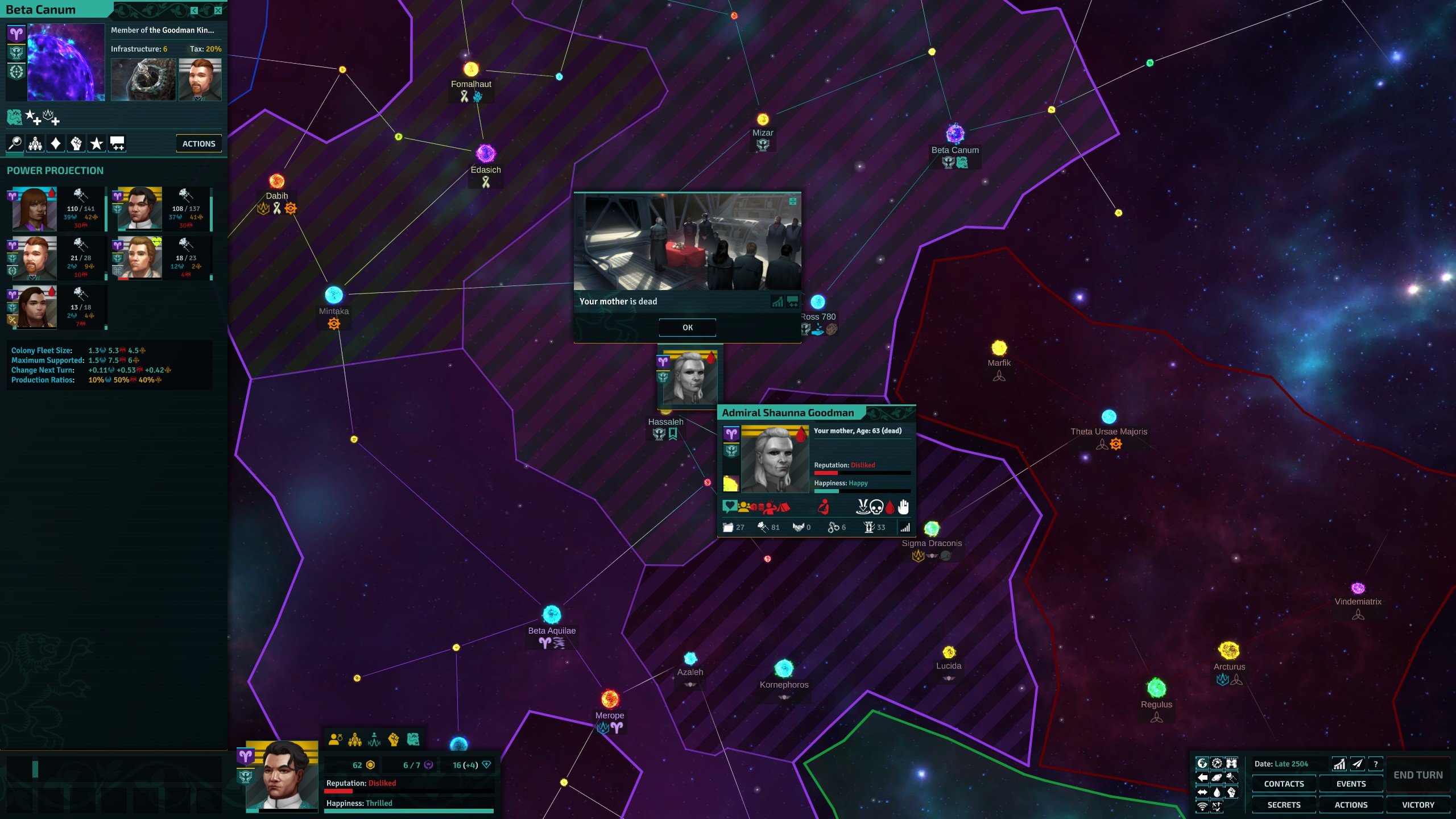Sex scandals are tearing the galaxy apart in my Star Dynasties campaign
Infidelity is way more deadly than a Death Star in this roleplaying strategy game.

Space tyrants always seem like they're having fun, just going around shooting lasers at planets they don't like, but it's all a facade. I've been trying to conquer the galaxy in Star Dynasties, which launched in Early Access this week, but I've been far too busy dealing with scandals and feeling sorry for myself.
Things aren't going well for Duke Fraser. My mum, who was also my best general, just died. I had to exile my brother after he had an affair with my wife. I'm having an affair of my own, and it might be a little bit responsible for a civil war. And you know what? I don't think we even know how to make lasers. I'm pretty sure I can salvage this disaster, however, because I've played quite a bit of Crusader Kings. Love triangles? NBD.
Since there aren't a lot of games that stitch together roleplaying and grand strategy, when something like Star Dynasties comes along the comparisons with Crusader Kings are inevitable. And Star Dynasties definitely invites them. It's a game of competing feudal dynasties where you play a character rather than an empire, and it's filled with opportunities for murder, marriage and fabricating claims on worlds so you can gobble them up. I feel very much at home.

All that intrigue, backstabbing and politicking in space is extremely appealing, but as an Early Access game being created by a small dev, expecting something with the scope of Paradox's massive grand strategy games is unrealistic. Instead of trying to match the breadth of Crusader Kings 3 or Stellaris, Star Dynasties focuses even more on its conniving nobles, while empire management and military strategy play more of a supporting role. You never need to think about fleet movements or construction projects, and what systems do persist are often streamlined or abstract. But It's proving to be the right balance.
It's a slimmer strategy game, but that also makes it a lot less daunting. I love the chaos of CK3, knowing that as soon as I unpause it the whole world will spring to life and start unravelling my plans, but I also appreciate the structure of Star Dynasties. It's more orderly and gives you something to hold onto when things threaten to get messy. It's turn-based, and you're allotted action points to determine what you can achieve on your turn. You can click on characters and locations to get lists of possible actions and their cost, or you can just bring up the master list that contains absolutely everything you can do that turn. And then you prioritise, deciding what characters and plots you value most.
Good point
After the unbridled freedom of CK3, I wasn't looking forward to being limited by action points, but it actually provides more options rather than taking them away. The amount of action points gained per turn is affected by a bunch of factors that can be manipulated, and you can also use them as a quick cash injection, banking excess points for gold. When things are going well, you'll have more points than you know what to do with—which means it's time to print those space bucks.

I'm still craving more ways to influence the galaxy, however. I'm used to forging alliances through marriage and plotting murders, so I want some new interactions unique to the sci-fi setting. A sense of progression that goes beyond expanding borders and developing relationships wouldn't go amiss, either. The stagnation of technology is one of the reasons everyone is stuck in a feudal society again, but there are other ways to achieve that forward momentum. I quite fancy the idea of slowly fleshing out my realm with laws and cultural traits, but any kind of meaningful improvement would be nice. 'Get big' is a nice, simple objective, but an elaborate strategy game like this deserves some more nuanced paths to victory (something that Stellaris, for example, has introduced plenty of over the course of its many DLCs). That said, I am enjoying painting the map in my colour.
The biggest gaming news, reviews and hardware deals
Keep up to date with the most important stories and the best deals, as picked by the PC Gamer team.
When the drama and intrigue turns into open conflict, Star Dynasties takes an abstract approach, and I dig it a lot more than I thought I would. Instead of building ships, recruiting armies and moving your armadas around the galaxy, combat can be kicked off with just a few clicks. When you're ready for war, you select the vassals you want to call on, assign a commander, and then the battle begins immediately. When the fleets meet, you get to make decisions based on the commander's abilities, with the aim being to counter your enemy or find their weakness. Some strategies favour different ship classes, while one lets you go straight for the throat, potentially taking out the enemy commander. Battles and wars can be won in seconds, but these victories are still earned through strategic choices you make before and during the scrap. You get to make the important calls, but you don't have to worry about military admin.

Star Dynasties has its own ideas about how to marry strategy and roleplaying, and it's shaping up to be a bit more than Crusader Kings in space, but it could do with borrowing one more thing from its historical counterpart: flavour. Paradox games are soaked in the stuff, but Star Dynasties is comparatively dry as a bone. Most notifications and events are terse and matter-of-fact, undermining all that lovely soap opera drama, as you can see from this message about a family tragedy above. It's hard to get into all the scandals and wars when the game doesn't muster up much enthusiasm. Most disappointing of all is the sidelining of the sci-fi conceit. Get rid of the star map and the occasional mention of 'nerve whips' and you'd think you were in medieval Europe.
Courting at court
It might not yet be the space opera I was hoping for, but it's still a capable storyteller. Take my love life, for instance. After some bad flirting at a boozy banquet, I became infatuated with a fellow noble. Before I could start awkwardly courting her, I was cruelly informed that she thought I was rubbish and was very much in love with her husband. This made me a sad space tyrant, and the duchy suffered because of my dour mood. Naturally, I decided to tear them apart. I asked my sister-in-law to start spreading lies about the husband, undermining their loving relationship. Frustratingly, our plot was uncovered, leading to the furious husband grassing me up to my liege. Justice was demanded. Good thing I was having a secret affair with my liege at the time, and she let me off the hook. I turned over a new leaf, deciding to focus on my first illicit romance instead of striking up a second one. That's real growth.
Unfortunately, the first affair might have been a mistake, too. We eventually had a baby, and everyone quickly found out about our secret sweaty meetings. This undermined the authority of my liege, who was already a bit unpopular. Her vassals started acting out, and rivals began eyeing up her dynasty's worlds. Within a few turns, she'd lost all but a few systems, leaving her dynasty one of the weakest in our faction. The rest of us are vultures now, picking apart the shattered realm and staring hungrily at the throne. I assume there's a throne. This hasn't actually been established. Regardless, things are going to get even more bloody.

Nothing seems random. Even seemingly insignificant events feel connected to the greater galactic story, and it's easier to see how actions relate to each other because Star Dynasties usually makes all the important context clear. You don't need to go diving into the menus to figure out why someone has been thrown in the dungeon or what started the latest war. The web of intrigue might be complex, but it's surprisingly easy to follow what's going on. It's also hard to step away from. The end of a turn can feel like a cliffhanger, and I need to know what's going to happen to these characters next, even if they don't have much personality. When I finally called it quits at 2 am last night, I'd just discovered that my exiled brother had died, and my son had taken up piracy. It was hard to resist the magnetic pull of that end turn button.
I'm in deep, I'm afraid. There are gaps, of course, and it still desperately needs an identity, but I'm already invested in the lives of these horny, dysfunctional nobles. Pawley Games estimates that it will be in Early Access for six months, and I look forward to discovering new ways to ruin the galaxy. In the meantime, I've got a civil war to fight.

Fraser is the UK online editor and has actually met The Internet in person. With over a decade of experience, he's been around the block a few times, serving as a freelancer, news editor and prolific reviewer. Strategy games have been a 30-year-long obsession, from tiny RTSs to sprawling political sims, and he never turns down the chance to rave about Total War or Crusader Kings. He's also been known to set up shop in the latest MMO and likes to wind down with an endlessly deep, systemic RPG. These days, when he's not editing, he can usually be found writing features that are 1,000 words too long or talking about his dog.

